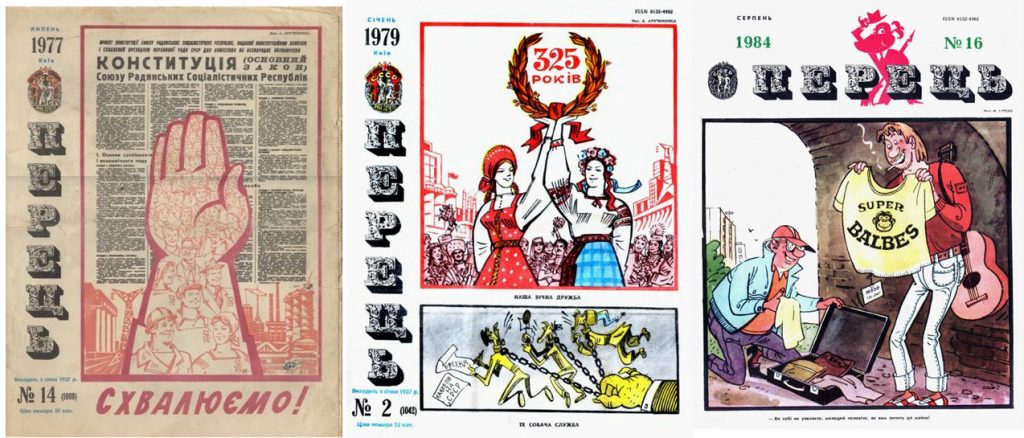By Anna Simile

On Monday, March 8, 2021, Miami University’s Havighurst Center for Russian and Post-Soviet Studies welcomed its third colloquium lecturer of this spring semester, Dr. Kateryna Yeremieieva, to discuss the Ukrainian satirical magazine “Perets [Pepper]”. A senior lecturer in the Department of History and Philosophy at Ukrainian State University of Railway Transport, Yeremieieva joined us on zoom from Kharkiv, Ukraine. She is also the author of over 40 scholarly publications and a monograph on Soviet Ukrainian humor and satire. Her lecture, “Not Just for Fun: The Soviet Satirical Magazines As a Weapon, Mediator, and Entertainment,” was an interesting discussion of “Perets” covering topics such as Soviet humor in Ukraine, censorship, editorship, and the reception of jokes.
“Perets” was a Ukrainian satirical magazine first published in 1941 by “Radyanska Ukraina”, which was a publishing house controlled by the Central Committee of the Communist Party of Ukraine. It began wartime production in Moscow, where it stayed until 1942, and then moved to Kiev. During the Postwar era, there were two different versions of Perets published, one in Eastern Ukraine and the other in Western Ukraine. The journal was reunified by 1951, and had a circulation over 100,000. Between 1954 and 1964, there were over 400,000 copies in circulation, and by 1979 there were about 3.3 million copies, according to Yeremieieva’s research. There was a sharp decline in production in 1991, and by the 2000s there were only about 10,000 copies in circulation.

Yeremieieva discussed how one of the primary functions of humor–and why satirical magazines such as “Perets” were so popular and influential–is because satire participates in the desacralization of the political leaders while at the same time prolonging their rule. This is achieved through the ambiguity of satire. One of the psychological functions of humor is to relieve stress. By allowing the readers to laugh at the government, Yeremeieiva points out that it allows the citizens to “blow off steam” and therefore avoid possible conflict with the authorities.
Yeremieieva argued that humor also functions to create and establish social group identities and norms, creating a form of organized laughter. As she describes, you can tell a political joke to determine someone else’s political views. If the reaction is negative, the joke contains an exemption of liability, allowing the teller to claim “it was just a joke” and thus releasing them from any political ramifications. If the reaction is positive, it can act as the first step in the creation of a social group, using the ideologies present in the joke as the foundation.
“Perets” was a Communist Party publication, and because of this, humor was often used as a weapon to push the political aesthetics of the Central Committee onto the populace. Satire was considered to be a strong weapon or tool of the Party, however, because of the ambiguity of humor, it served as a double edged sword. Yeremieieva discussed the difference between “real” resistance, and “everyday” resistance. “Real” resistance can be defined as organized, collective, open, and principled, while “everyday” resistance is more disorganized, private, hidden, and opportunistic, and thrives through rumors and jokes about authorities, or a “small sabotage”. And so, satire acts as a double edged sword by using its ambiguity to simultaneously support the political aesthetics of the Central Committee, while also acting as a medium for everyday resistance to take place.
Yeremieieva’s lecture on the use of humor in “Perets” magazine uncovered a complex world of humor in Soviet Ukraine. Her perspective on the functions of humor, from creating organized laughter and relief of stress, to expressing political opinions of others, to being used for political aspirations as well as resistance to the authorities, was detailed, engrossing, and unforgettable.
Anna Simile is an Anthropology Major at Miami
